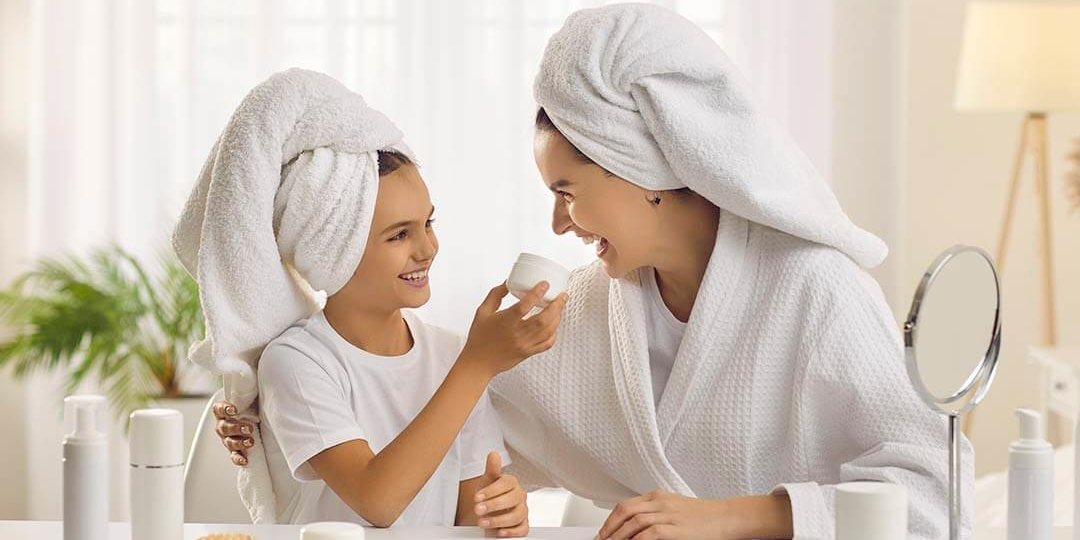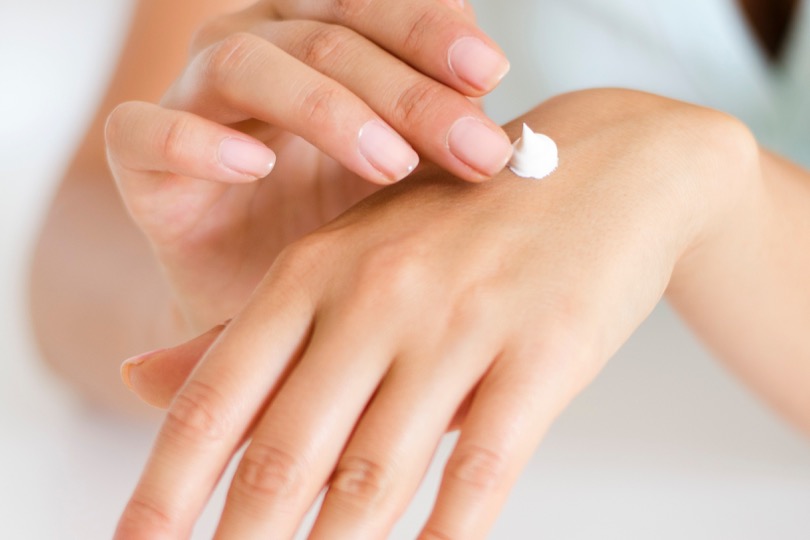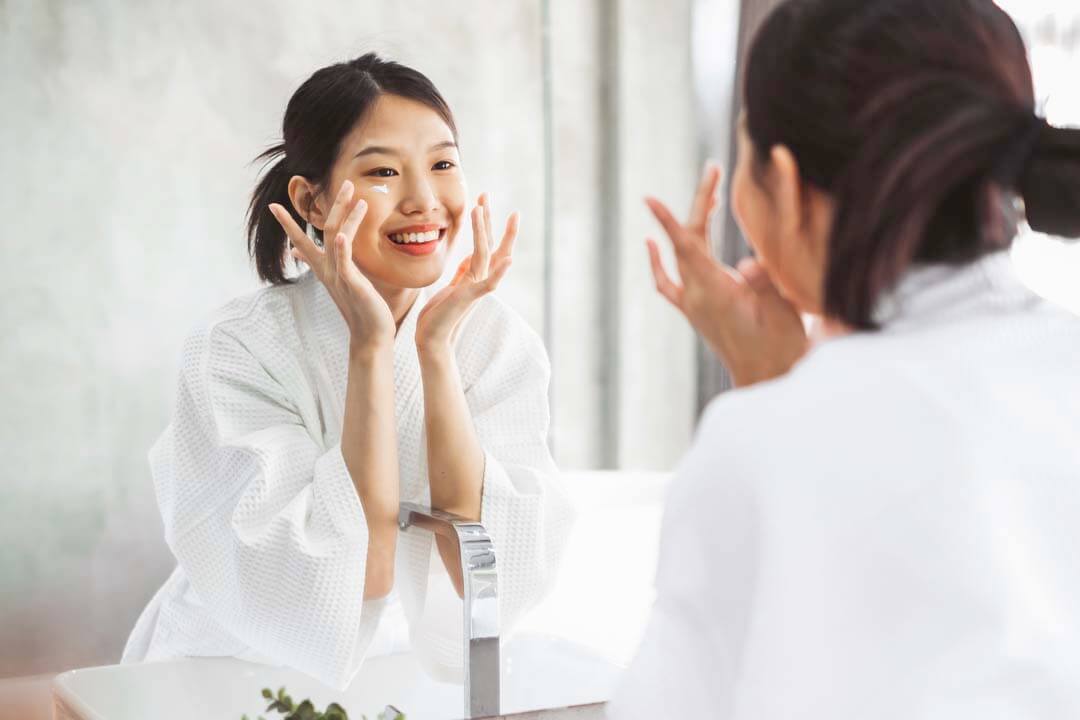Starting a Lifetime of Glow: Skincare for Tweens and Teens
As a female plastic surgeon and mom to a tweenager, I wanted to chat about a topic that’s near and dear to my heart: skincare for tweens and teens. It’s a time of immense change, and that includes what’s happening with their skin. With all the misinformation out there, we wanted to share something real.
Navigating Puberty’s Skincare Storm
Watching our sons’ and daughters’ skin go from baby soft and smooth to peppered with pimples and redness is so frustrating. We want to give them all the lotions and potions to make the blemishes disappear so we can see our teens’ lovely faces again. Worse yet, the makeup and goop from the hair products and Sephora or Ulta shopping sprees make the breakouts even worse.
Let’s face it, puberty can feel like a bit of a rollercoaster, and often, the skin is right there with it, experiencing its own set of ups and downs. Increased hormones can lead to increased oil production causing breakouts. This includes everything from blackheads and whiteheads to more inflammatory acne. Some might even experience rosacea, although this is less common in younger teens.
The good news? A little bit of knowledge and a consistent routine can make a huge difference. The goal isn’t to achieve “perfect” skin (because, let’s be real, perfect skin doesn’t exist!), but foster healthy skin habits that will serve them well for years to come.
Skincare for Tweens and Teens: Retail (Sephora, Ulta, or the drugstore) versus Medical-Grade Skincare
Many people think all skincare products are pretty much the same, whether you grab them from Sephora or Ulta, or get them from a doctor’s office. But there’s a really important difference, especially when it comes to how well they actually work and how strong their ingredients are. While those lotions and potions you see online and in stores might look and smell great, they often don’t have enough of the powerful ingredients to really change your skin in a meaningful way. This means they might not get deep enough into your skin, leading to results that just aren’t what you hoped for.
What’s more, many retail products targeting skincare for tweens and teens have a lot of extra stuff like fragrances and fillers. These might make the products seem appealing, but they can actually weaken the main ingredients, sometimes even irritate your skin, or just fail to tackle your specific skin issues effectively. This is where medical-grade skincare is different. These products are typically found at places like our office because they have stronger, active ingredients that the FDA requires to be accurately labeled. They often work so well they cannot be purchased without medical supervision.
The real strength of medical-grade skincare is in its higher amounts of ingredients that are proven to work, along with advanced ways to get those ingredients deep into your skin. This ensures they reach the areas where they can truly make a difference. When you combine these powerful products with expert guidance from a professional, we can create a personalized plan just for you. This allows us to target your unique concerns, like active acne or scars, dark spots, wrinkles and fine lines, making sure you get the best possible results and healthier, more radiant skin.
The Foundation: A Simple Skincare Routine
For tweens and young teens, simplicity is key. Their skin is still developing, and you don’t want to overwhelm it with too many products. Think of it as just THREE simple steps:
- Cleanse: Twice a day, morning and night. Look for a cleanser that is sulfate-free and non-comedogenic (meaning it won’t clog pores). For more acne-prone faces, we suggest considering exfoliating cleansers with salicylic acid and antioxidants.
- Moisturize: Yes, even if their skin feels oily! A lightweight, non-comedogenic moisturizer is crucial to maintain the skin barrier and prevent it from overcompensating by producing even more oil. We like light moisturizers that encourage skin repair and soothe inflammation. Remember – the key word is “noncomedogenic” – it shouldn’t clog pores or all of this work is for naught!
- Protect: Sunscreen every single day! A broad-spectrum SPF 30+ is non-negotiable. Sun damage starts young, and this is the most important anti-aging product they’ll ever use.
If your teen is using a retinol, sunscreen is an absolute MUST, as the retinol can increase their sensitivity to sun causing sunburns with minimal sun exposure!
Note: For mild breakouts, a salicylic acid or benzoyl peroxide spot treatment can be helpful after cleansing your face. However, I always recommend starting slow and patch-testing first. Medical grade retinols and retinoic acid (over the counter and prescription strength) are powerful tools for consistent acne care when used under medical guidance. Let’s take a deep dive into retinols and teenagers!
A Word on Retinol: Do's and Don'ts for Young Skin
Now, let’s talk about a buzzword that pops up a lot in the skincare world: retinol. Is retinol use appropriate for teens? While retinol is a superstar ingredient for anti-aging and acne in adults, it’s generally not recommended that most tweens and young teens go and start retinols on their own without medical guidance. Their skin is more sensitive and easily irritated, and retinol use in teens is not recommended for anti-aging. Instead, retinol use in teenagers is appropriate for managing acne, oil and resultant inflammation and scarring from breakouts. Anti-aging products for mature women are simply not appropriate for teenagers.
It’s important to recognize that commercially available and medical grade retinols come in various different strengths. Lighter ones are more appropriate for younger teens and tweens, while more concentrated ones are more appropriate for adult women trying to prevent and treat fine lines and coarse wrinkles.
However, in specific cases of persistent or severe acne that isn’t responding to other treatments, a dermatologist or plastic surgeon might prescribe a topical or even oral retinoic acid (the most potent form of a retinoid). This should be done under strict medical supervision due to the potential for dryness, redness, and sun sensitivity. The oral retinoid, isotretinoin, can have serious side effects and is not started lightly.
The risks of over-the-counter skincare products, especially those containing active ingredients like retinol, are higher for younger skin. Many over the counter retinols may do more harm than good, leading to irritation and compromising the skin barrier. Stick to medical-grade skincare products when considering any advanced skin treatments, and always consult a professional.
Beyond the Basics: When to Seek Professional Skincare Help
If your teen is struggling with persistent or painful acne, or if you suspect rosacea, don’t hesitate to seek professional help. A plastic surgeon or dermatologist can accurately diagnose the issue and recommend a tailored treatment plan, which might include prescription medications or in-office procedures.
Remember, building healthy skincare habits now is an investment in your tween or teen’s future skin health. It’s about empowering them to feel confident and comfortable in their own skin, no matter what stage of life they’re in. Schedule a skincare consultation today! (919) 797-0996. Stay glowing!











